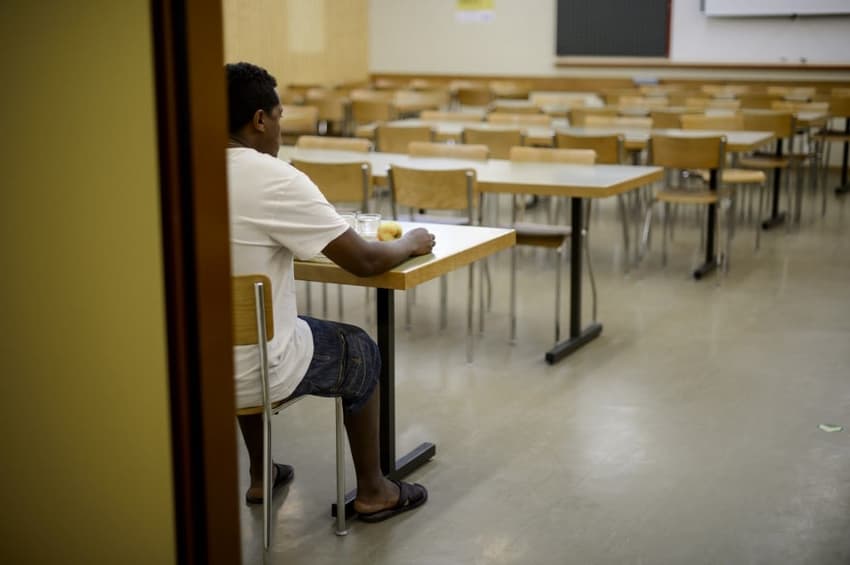Here's why Switzerland is temporarily closing two asylum centres

The Swiss government has decided to temporarily close two asylum centres on the back of falling numbers of asylum claims.
The State Secretariat for Migration (SEM) said on Monday the Kappelen centre in the canton of Bern and the Muttenz centre in the canton of Basel-Landschaft would be closed for the time being.
In a statement, the SEM said the move would mean savings of 30 million Swiss francs (€27.3 million) a year.
READ ALSO: Switzerland wants 'total travel ban' for failed asylum seekers
It will see the number of beds in Switzerland’s asylum system reduced from 4,000 to 2,200. Around half of those 4,000 beds are currently occupied.
The plan is for the centres that remain open to run at around 80 percent capacity. This will still allow Switzerland to process 16,000 asylum claims a year, according to the SEM.
Falling asylum numbers
The announcement comes in the wake of falling numbers of asylum claims in Switzerland.
The SEM is expecting 14,500 asylum claims in 2019 – a long way down from the peak of nearly 40,000 in 2015 and the lowest figure since 2007.
The migration agency said the centres in Kappelen and Muttenz could be reopened within four to 12 weeks if they were needed again.
It said that the system could therefore adapt to changes in requirements.
Plans for new asylum centres still in place
However, at the same time as asylum centres are being temporarily closed, Switzerland is pushing ahead with an asylum strategy backed by Swiss voters in the polls back in 2016.
Under the strategy designed to speed up the processing of asylum claims from the 400-day average of 2016 to 140 days, voters backed plans to make 5,000 beds available in larger, federal asylum seeker centres.
On Saturday, a new centre will open in Flumenthal in the canton of Solothurn while there are further plans for a new centre in the canton of Schwyz and in north-western Switzerland.
But the State Secretary for Migration Mario Gattiker said on Monday that this was not a contradiction.
He said the events of 2015, when hundreds of thousands of people came to Europe to escape from conflict in the Middle East, showed that “we have to be able to react quickly”.
“We are standing by our goal of 5,000 beds,” he said.
Comments
See Also
The State Secretariat for Migration (SEM) said on Monday the Kappelen centre in the canton of Bern and the Muttenz centre in the canton of Basel-Landschaft would be closed for the time being.
In a statement, the SEM said the move would mean savings of 30 million Swiss francs (€27.3 million) a year.
READ ALSO: Switzerland wants 'total travel ban' for failed asylum seekers
It will see the number of beds in Switzerland’s asylum system reduced from 4,000 to 2,200. Around half of those 4,000 beds are currently occupied.
The plan is for the centres that remain open to run at around 80 percent capacity. This will still allow Switzerland to process 16,000 asylum claims a year, according to the SEM.
Falling asylum numbers
The announcement comes in the wake of falling numbers of asylum claims in Switzerland.
The SEM is expecting 14,500 asylum claims in 2019 – a long way down from the peak of nearly 40,000 in 2015 and the lowest figure since 2007.
The migration agency said the centres in Kappelen and Muttenz could be reopened within four to 12 weeks if they were needed again.
It said that the system could therefore adapt to changes in requirements.
Plans for new asylum centres still in place
However, at the same time as asylum centres are being temporarily closed, Switzerland is pushing ahead with an asylum strategy backed by Swiss voters in the polls back in 2016.
Under the strategy designed to speed up the processing of asylum claims from the 400-day average of 2016 to 140 days, voters backed plans to make 5,000 beds available in larger, federal asylum seeker centres.
On Saturday, a new centre will open in Flumenthal in the canton of Solothurn while there are further plans for a new centre in the canton of Schwyz and in north-western Switzerland.
But the State Secretary for Migration Mario Gattiker said on Monday that this was not a contradiction.
He said the events of 2015, when hundreds of thousands of people came to Europe to escape from conflict in the Middle East, showed that “we have to be able to react quickly”.
“We are standing by our goal of 5,000 beds,” he said.
Join the conversation in our comments section below. Share your own views and experience and if you have a question or suggestion for our journalists then email us at [email protected].
Please keep comments civil, constructive and on topic – and make sure to read our terms of use before getting involved.
Please log in here to leave a comment.